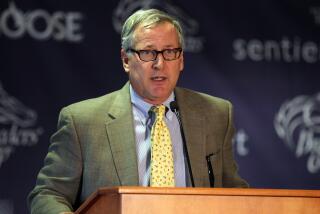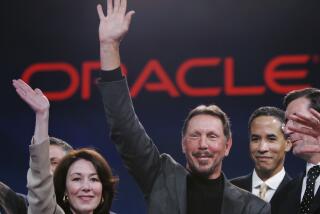Eli Broad to Retire as Chief of SunAmerica
- Share via
Eli Broad, the billionaire home builder and insurance executive with a reputation as Los Angeles’ most fervent corporate cheerleader, said Thursday that he will retire as chief executive of retirement savings company SunAmerica Inc. to devote more time to philanthropy.
One of the nation’s wealthiest individuals--he ranks No. 48 with more than $4 billion on the Forbes 400 list--Broad has developed a passion for what he calls “venture philanthropy,” whereby he funds new programs rather than giving to established institutions, in the belief that such an approach fosters innovation.
Broad, 67, said his retirement, scheduled for Jan. 1, will allow him to add to the 20 to 30 hours a week he currently spends on charitable efforts. Over the last year, he has turned over much of the day-to-day operations at SunAmerica to other executives.
In an interview, Broad pointed to his $23-million contribution to build the Broad Center for Biological Sciences at Caltech, which broke ground Tuesday, as an example of the types of projects he will pursue in the future.
“The center groups experts in biology, physics, chemistry and engineering together because we believe that the major improvements in the human medical condition will not come from the major medical centers . . . but rather from areas where pure researchers can work together,” Broad said.
Education also will remain a focus of his giving. Broad was part of the search committee that helped select the Los Angeles Unified School District chief, former Colorado Gov. Roy Romer.
“As we have gone from a manufacturing economy to an information economy, education becomes even more important because of the pay gap between knowledge workers and others,” Broad said.
“We have to give our kids the opportunity to become knowledge workers or else we will wipe out the middle class,” he said.
All told, Broad and his wife Edythe have donated more than $250 million to various organizations, mostly Southern California projects in the arts, education and sciences.
Civic leaders welcomed the retirement of Broad.
“This will give him more time to spend on the downtown renaissance, his education foundation and maybe to buy a few more buildings for UCLA and Caltech,” said Los Angeles Mayor Richard Riordan.
Riordan credited Broad with getting the long-stalled Walt Disney Concert Hall project in downtown Los Angeles moving forward.
“This is about what Eli is going to do with the next chapter of his life,” said longtime friend Barry Munitz, president and chief executive of the J. Paul Getty Trust, which runs the Getty Center. “If he puts his energy into these issues like he did for his companies . . . that is going to extraordinary for the future of Los Angeles.”
Broad, a Brentwood resident since 1963, also was one of the key movers in attracting the Democratic National Convention to Los Angeles, believing that the media attention and focus on the city would improve its image.
In becoming one of the nation’s wealthiest individuals Broad has demonstrated a savvy ability to play off of demographic trends.
He entered the home-building business in Detroit in 1957, when the GIs of World War II had returned home, found jobs, started families and needed inexpensive homes in which to live. His first homes sold for about $12,000, roughly 10% less than competitors, because Broad and his partner Donald Kaufman built houses without the customary basements.
This low-cost approach to home building took off and the partners moved West, first to Arizona and then booming California. Kaufman & Broad has built more than 500,000 homes to date, according to Broad. In the late 1980s and early 1990s, the company was the target of several homeowner lawsuits alleging substandard construction, and paid out millions of dollars in fines and settlement costs.
In 1971, Broad purchased an insurance company as a hedge against the cyclical nature of the housing market. Now called SunAmerica, it was later separated from the home builder. Broad transformed the business into a retirement savings company based on the belief that the baby boomers who snapped up his homes would also need savings vehicles for retirement.
SunAmerica grew rapidly from a business with a market value of $184 million to peak at $18.5 billion, when it was acquired by American International Group for $16.5 billion in a deal announced in late 1998. Broad’s holdings in AIG are worth about $4.5 billion at Thursday’s close of $92, up 25 cents on the New York Stock Exchange.
SunAmerica, one of the nation’s largest sellers of annuities, earned $706 million on revenue of $11.3 billion and total assets of more than $55 billion in 1999. It has 1,000 employees in Southern California, mostly at the 39-story SunAmerica building in Century City, and 2,500 nationwide.
Jay Wintrob, a Broad protege and chief operating officer of SunAmerica, will succeed Broad as chief executive. Broad will remain chairman of SunAmerica and will stay on the board of New York-based AIG.
SunAmerica said Broad’s new role will be to help develop long-term strategy and investment policies and to look for acquisitions.
“Eli did a fantastic job building SunAmerica into the country’s leading retirement savings company, and I am delighted that he will continue to help guide its strategic policies,” said Maurice Greenberg, chairman of AIG.
Broad said that after heading companies since the age of 23, he’s glad to be getting away from the day-to-day operations of a business.
“Jay has really been running SunAmerica for the past year,” Broad said.
Industry analysts speculated that there wasn’t much reason for Broad to continue in a day-to-day position, since his role had likely declined after SunAmerica became a division of giant AIG.
“He made a lot of money. Maybe it was just time to quit,” said Gary Ransom, an analyst at Conning & Co. in Hartford, Conn.
(BEGIN TEXT OF INFOBOX / INFOGRAPHIC)
AIG’s Hot Performance
Shares of American International Group (ticker symbol: AIG) have more than doubled since August 1998, when the insurance giant bought Los Angeles-based SunAmerica.
AIG shares, monthly closes and latest on the New York Stock Exchange
August 1998: AIG buys SunAmerica
Thursday: $92.00, up 25 cents
Source: Bloomberg News







